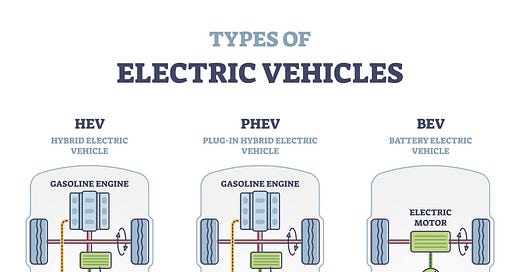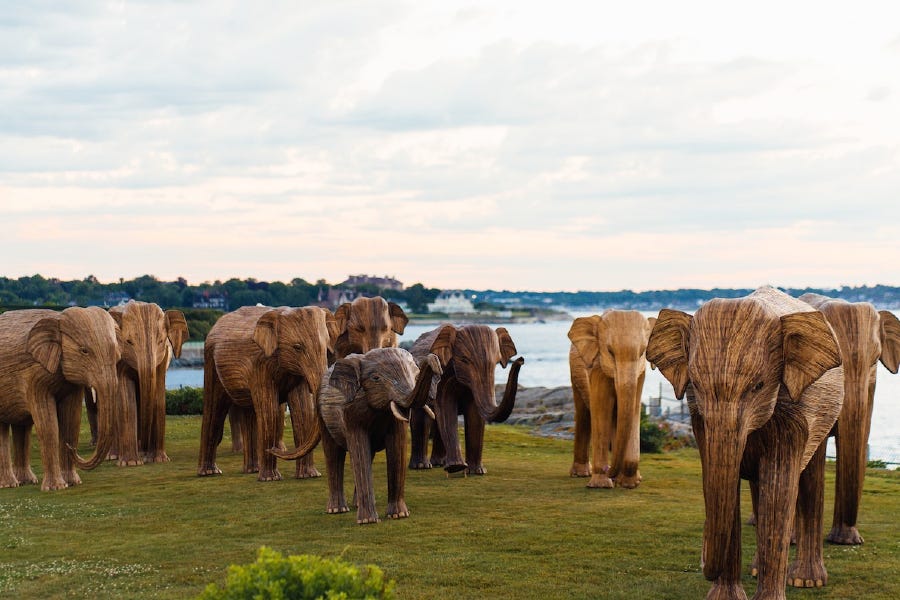The right kind of leader, doing the right thing, is economic growth always good?, dementia prevention, herd of wooden elephants, recycling on the moon, HEVs, PHEVs, and BEVs
August 5, 2024 - The Nett Report
Every other week, the award-winning Nett Report provides readers with thoughtful perspectives helpful to navigating life in a changing world. Past issues.
In the last issue, we asked readers: What do you most appreciate about The Nett Report? We were delighted with the responses. Thanks! Here’s a sampling.
“I LOVE reading all of your emails. No other email causes me to stop everything and read.”
“Timely and relevant topics. Very informational and educational.”
“Distilled down information on today's key issues that help make sense in our ever-fast-paced and changing world.”
Political Divide
“I keep coming back to the Ernest Hemingway quote about how bankruptcy happens. He said it happens in two stages, first gradually and then suddenly. That’s how scholars say fascism happens, too—first slowly and then all at once—and that’s what has been keeping us up at night.” – Historian Heather Cox Richardson in Letters from an American, July 28, 2024
“No single political form is adequate for the multi-scalar nature of planetary problems.”
For the intellectuals in our readership, an in-depth article in aeon, Governing for the Planet, argues that “Nation-states are no longer fit for purpose to create a habitable future for humans and nature,” and asks “Which political system is?”
Minnesota Governor Tim Walz, the kind of leader we need
Last year at the Esri User Conference Executive Session, I had a chance to talk with Minnesota Governor Tim Walz. I was favorably impressed. This year, he spoke at Esri’s plenary session to more than 18,000 attendees. The former high school geography teacher talked about how Minnesota is solving its problems using technology, information, and visualization. This wasn’t a political speech, yet his down-home, matter-of-fact understanding drew a standing ovation from this technology crowd. I wanted to include a link to his speech in the last issue of The Nett Report, but a link wasn’t yet available. I had wanted to say that if the Democrats had an open convention, he would be one of the people who should be in the running. Now Governor Walz is in the running to be vice president. We’ll know shortly. He is called a progressive, but that’s not what is important. I think the former Republican Governor of Ohio, John Kasich, falls in the same category, and he is labeled a conservative. This isn’t an endorsement of Walz for VP, but rather an opinion of someone with the right kind of character to lead. The kind of people we need now and in the future.
Project 2025 summary and links
There has been a lot of talk in the media about the Heritage Foundation’s Project 2025. As a service, we are providing links to the project and Wikipedia’s comprehensive analysis.
Future of Work / The Economy
Esri prioritizes solving the world’s problems, doing the right thing
A July 5, 2025, story in yahoo!finance describes how Esri, a global provider of geographic information systems (GIS) software, location intelligence, and mapping, has three priorities that are the reverse of most companies:
To help customers solve the world’s problems.
To make a place for employees to do their life’s work, to contribute to something important, and to feel that they’re making a difference.
Running a healthy business.
Most companies have number 3 at the top of their priorities – maximizing shareholder value. Privately held Esri sees income “as a way to fund meaningful work with customers” which helps make a company healthier. Brian Cross, who heads its professional services division, says “One of Esri’s greatest assets is our long-term, loyal customer base, because we treat them as partners, because we do the right thing, time and time again.”
Two global leaders cast doubt that economic growth is always good
One of the measures of economic health is growth, but two internationally known leaders are questioning that measure. Former U.S. Labor Secretary Robert Reich in his August 2, 2024, newsletter, says, “Unconstrained economic growth is causing such grave harm to the climate that its costs are likely to be greater than the gains.” He says mainstream economists don’t measure the costs of growth and see costs like deaths and injuries caused by chemical pollution, wildfires, and more intense hurricanes and storms as externalities. “If we accept that the Earth is a finite resource, let’s also agree that infinite growth will destroy the Earth. It’s already on its way.” Primatologist Jane Goodall concurs but thinks it’s not too late to save the world. In an August 5, 2024, story in Wired, Goodall says, “It’s only when individuals secure their own livelihoods that they’re inclined to confront the repercussions of their actions and address their environmental impact.” She does not believe that “unlimited economic development can be achieved on a planet with limited natural resources and a growing population … It doesn’t make sense, it’s not sustainable,” she says.
CEOs see regulation and taxes as areas most likely impacted by the election
This year’s Fortune/Deloitte CEO survey measured business leaders’ views on areas most likely to affect their companies. More than 80 CEOs from the Fortune 500 and select companies responded. The survey was taken before the attack on former President Donald Trump and President Biden’s decision to not seek reelection. The following findings were reported in the July 24, 2024, issue of Fortune:
46% of respondents ranked regulation and taxes as the business areas likely to be impacted by the U.S. election. Only 27% ranked immigration among their top three.
Geopolitical instability, inflation, and regulation were the top three external issues they expect to influence or disrupt their business strategy over the next 12 months.
Overall, CEOs reported mounting pessimism about their respective industries’ futures.
The majority have some degree of confidence in their company’s ability to navigate external disruptors.
Almost one in five CEOs now regularly uses generative AI tools as part of their job.
Climate Change
“There will be obstacles. There will be doubters. There will be mistakes. But with hard work, with belief, confidence, and trust in yourself and those around you, there are no limits.” - Michael Phelps, Olympic swimmer
A comparison of HEVs, PHEVs, and BEVs
in the August 5, 2024, issue of Sustainability by the Numbers newsletter, Hannah Ritchie provides a thorough analysis of the differences and benefits of fully electric vehicles, plug-in hybrids, and hybrids.
Microsoft’s electricity use doubled over four years, emissions also grew
The growth of artificial intelligence also causes growth in energy use and emissions. An example posted on Visual Capitalist on August 1, 2024, is Microsoft, whose electricity use has more than doubled from 11 terawatt-hours to 24 TWh since 2020. Carbon emissions did not grow at the same rate, increasing by 42% as Microsoft seeks to be carbon-negative by 2030. Much of the growth in use came from AI. For example, training OpenAI’s GPT-4 used up to 62,000 megawatt hours, equal to the energy needs of 1,000 U.S. households over 5-6 years. The data centers built for AI are more power-hungry than those providing email or website services. “Just the construction of Microsoft’s data centers has accounted for 30% of the emissions increase between 2020–23.”
Improving China’s air pollution increased ocean warming
Sometimes unintended consequences result from policy decisions. According to a May 26, 2024, article in Yale Environment 360, China’s dramatic cleanup of air pollution has resulted in “a decline in smog particles which shield the planet from the sun’s rays.” This has “accelerated warming and set off a chain of atmospheric events across the Pacific that have, in effect, cooked the ocean … declines in aerosol cooling are already factored into projections of future global warming by the Intergovernmental Panel on Climate Change (IPCC). But the new findings on the cause of the warm Pacific blob suggest that we can also expect more and bigger regional climatic surprises.”
How do consumers feel if a social or environmental program fails?
In new research from TriplePundit and the research technology firm Glow, consumers in the United States were asked how they’d feel if a company launched a social or environmental program, scrapped it because it wasn’t effective, and then publicly talked about the failure and what they learned.
44% said they'd think better of the company for being transparent.
19% said they wouldn't feel strongly either way because they know every effort can’t be successful.
14% said they’d think less of the company.
Health
“In politics, there is no ‘world;’ only states. For pathogens, there are no ‘states;’ there is only the world.” - Jonathan S Blake, associate director of programs at the Berggruen Institute and the associate editor of Noema magazine.
Who would you spend the last day of your life with?
In a Facebook post, a young man asked Warren Buffet, If you had one more day with Charlie Munger (Buffet’s closest friend), what would you do with him? Buffet’s response: “What you should probably ask yourself is who do you feel that you want to start spending the last day of your life with and then figure out a way to start meeting them, and meet them as often as you can. Why wait till the last day?”
New study says dementia is preventable
A new study in the medical journal Lancet as reported by Time on July 31, 2024, says “Nearly half of dementia cases could, in fact, be prevented or delayed if people adopted certain habits.” Those habits include:
Keep your brain busy
Socialize
Stay physically active
Wear a helmet
Take care of your mental health
Follow doctor’s orders
Don’t drink too much or smoke
Protect your senses
The Nett Light-Side
Herd of 100 wooden elephants is migrating across the U.S.
According to a July 12, 2024, story in My Modern Met, 100 wooden, full-size elephants are migrating across the U.S. to celebrate the beauty of the majestic animals and promote habitat conservation and human-wildlife coexistence. “The incredible traveling installation, titled The Great Elephant Migration, is organized by Elephant Family USA and Art&Newport and curated by Dodie Kazanjian.”
NASA wants ideas about how to recycle on the moon
NASA is always thinking ahead. Now, the space agency is looking for ideas about how to recycle on the moon. According to an article in Waste Advantage on July 22, 2024, the agency’s Centennial Challenges Program, “aims to reduce solid waste streams during long-duration lunar missions under the Artemis Program, as well as to improve the sustainability of future space exploration.”
About Carl Nettleton
Carl Nettleton is an award-winning writer, speaker, thought partner, facilitator, and subject-matter expert regarding water, climate, sustainability, the ocean, and binational U.S.-Mexico border affairs. Nettleton Strategies, the consultancy he founded in 2007, is a trusted source of analysis and advice on issues at the forefront of public policy, business, and the environment. He helps people and organizations to think strategically about their options for change. He is also the founder of OpenOceans Global, a nonprofit addressing ocean plastic in a new way.







